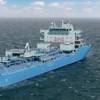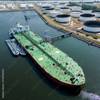Pro-Russian militants raised their flags over official buildings in two eastern Ukrainian cities on Saturday, deepening a stand-off with Moscow which, Kiev warned, was dragging Europe closer to a "gas war" that could disrupt supplies across the continent.
At least 20 men armed with pistols and rifles took over the police station and a security services headquarters in Slaviansk, about 150 km (90 miles) from the border with Russia.
Officials said the men had seized hundreds of pistols from arsenals in the buildings. The militants replaced the Ukrainian flag on one of the buildings with the red, white and blue Russian flag.
Some local residents helped the militants build barricades out of tyres in anticipation that police would try to force them out, a Reuters photographer at the scene said.
But it was not clear how the authorities would tackle the militants after the police chief for the region quit.
Kostyantyn Pozhydayev came out to speak to pro-Russian protesters outside his offices in the regional capital, Donetsk, and told them he was stepping down "in accordance with your demands." Some of his officers left the building.
The protesters were occupying the ground floor of the Donetsk police headquarters and the black and orange flag adopted by pro-Russian separatists flew over the building, in place of the Ukrainian flag, a Reuters reporter said.
The occupations are a potential flashpoint because if protesters are killed or hurt by Ukrainian forces, that could prompt the Kremlin to intervene to protect the local Russian-speaking population, a repeat of the scenario in Crimea.
Moscow denies any plan to send in forces or split Ukraine, but the Western-leaning authorities in Kiev believe Russia is trying to create a pretext to interfere again. NATO says Russian armed forces are massing on Ukraine's eastern border, while Moscow says they are on normal manoeuvres.
Ukraine's acting foreign minister, Andrii Deshchytsia, said he had spoken in a phone call with Russian Foreign Minister Sergei Lavrov and demanded Moscow stop what he called "provocative actions" by its agents in eastern Ukraine.
Russia and Ukraine have been in confrontation since protests in Kiev forced the Moscow-backed president from office, and the Kremlin sent troops into Crimea.
BAD SOLUTION
While the crisis within Ukraine itself is still unresolved, the gas dispute threatens to spread the impact of the row to millions of people across Europe.
A large proportion of the natural gas which EU states buy from Russia is pumped via Ukrainian territory, so if Russia makes good on a threat to cut off Ukraine for non-payment of its bills, customers further west will have supplies disrupted.
Russia is demanding Kiev pay a much higher price for its gas, and settle unpaid bills. Russian state-owned gas giant Gazprom and its Ukrainian counterpart, Naftogaz, are in talks, but the chances of an agreement are slim.
"I would say we are coming nearer to a solution of the situation, but one in the direction that is bad for Ukraine," Ukrainian Energy Minister Yuri Prodan said in an interview with the German newspaper, Boersenzeitung
"We are probably steering towards Russia turning off its gas provision," he was quoted as saying.
That raised the spectre of a repeat of past "gas wars", when Ukraine's gas was cut off, with a knock-on effect on supplies to EU states.
The scope for compromise narrowed after the Naftogaz chief executive told a Ukrainian newspaper Kiev was suspending payments to Gazprom pending a conclusion of talks over a new deal.
Ukraine has de facto stopped payments already because it failed to make an instalment of over $500 million due earlier this month to Russian state gas giant Gazprom.
Gazprom spokesman Sergei Kupriyanov, asked by Reuters about the statement by the Naftogaz chief, said: "What does suspending mean? They've not paid at all," since mid-way through last month.
Moscow says it does not want to turn off Ukraine's gas if it can be avoided, and that it will honour all commitments to supply its EU customers.
Kiev and Brussels are working out ways to keep supplies flowing to EU states, and for those countries to then pump the gas to Ukraine by reversing the flow in their pipelines.
The crisis has been seized upon by some right-wing nationalists in the EU who are campaigning for next month's European Parliament elections. They blame Brussels for antagonising Russia.
Marine Le Pen, leader of France's far-right National Front was in Moscow on Saturday and met the speaker of Russia's lower house of parliament, one of the people on an EU sanctions list.
"I am surprised a Cold War on Russia has been declared in the European Union," Russian media quoted her as saying.
The EU and the United States imposed sanctions on Russian officials and leading business figures in response to Moscow's annexation of Crimea, which is home to Russia's Black Sea fleet and was part of Russia until 1954.
Moscow has so far scoffed at the Western measures and warned that, in the long run, the EU and Washington will come off worse by losing out on trade with Russia.
Gennady Timchenko, a billionaire oil and gas trader who is on the U.S. list of people subject to asset freezes and visa bans, joined the chorus of Russian defiance.
"The fact that I was included in the list was a little surprising maybe, but it was quite an honour for me," he said in an interview with the state-run Rossiya television station to be broadcast later on Saturday.
He said Russian natural gas would increasingly be sold to Asia, as part of a strategy of turning away from a Europe which the Kremlin considers unfriendly.
"It seems to me they (the Europeans) just don't understand. The politicians are behaving ... in a very short-sighted way."
(Additional reporting by Alexei Anishchuk, Alessandra Prentice and Vladimir Soldatkin in Moscow, William Schomberg in London, Annika Breidthardt in Berlin, Lina Kushch in Donetsk, Ukraine and Gleb Garanich in Slaviansk, Ukraine; Writing by Christian Lowe; Editing by Robin Pomeroy)














